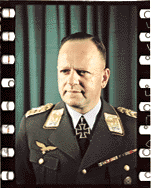[images and
captions added by this website]

London, March 17, 1974 Göring's
Shadow Göring's
Shadow
- THE
RISE AND FALL OF THE LUFTWAFFE by David Irving:
Weidenfeld & Nicholson £5.95, pp
451
by David
Divine A YEAR before the outbreak of the First World
War Erhard Milch, a lieutenant of artillery,
applied to his commanding officer for flying
training and was told, brusquely, that "officers
are too valuable for such tomfoolery." Three years
before World War II Hitler declared in a
speech, "Two names are ineradicably linked with the
birth of our Luftwaffe -- "Göring and
Milch." The history of flying is intrinsically
eccentric. David Irving's remarkable exploration of
the mind of Milch is presented against the grand
design of his achievement in the German air. It is
inevitably a history of failure -- Milch was
sentenced to life imprisonment at Nuremberg -- but
it is a history of a failure that was always close
to success and failed only because of the even
greater eccentricities of others. A non-flying intelligence officer at the end of
the First World War, Milch was invited to establish
a Police Air Squadron at Königsberg which he
used to collect illicit aircraft. Progress from
there to precarious one plane aircraft companies
led to the turbulent emergence of Lufthansa. Barely
eight years later Göring invited him to be
state secretary of a newly created Air Ministry and
effectiveIy to be the creator of a new German Air
Force, with its fantastic potentials of triumph and
disaster. In January 1943 Field Marsha1 Milch was ordered
to save the Sixth Army, which the Fuhrer's
stubbornness, Paulus's docility and Goring's
vanity had trapped in Stalingrad He was still moderately optimistic when he
arrived at von Richthofen's headquarters at
Taganrog, and the Stalingrad chapter chronicles
movingly his efforts to solve a disaster of
incompetence, ignorance and the insanities of high
command.Encased in plaster (his car had been
involved in a collision with a train), he continued
the struggle until it ended in a nightmare of
failure, with the loss of Stalingrad and 300,000
men. It is possible at that point to feel sympathy
for him; but not in relation to Irving's sustained
attack on the indignities which Milch suffered at
Nuremberg, The indignities need not be questioned;
and it is true that, at Nuremberg, Milch said: "I
can think of nothing crueller and more
objectionable than air raids on civilian
populations." But it was the same Milch who
gleefully recorded in his diary how he had reported
to Hitler that his personal brainchild, the Flying
Bomb, was ready: "I suggested to him that we ought to
open fire on his birthday and then not as an
annihilating attack but as the most evil torture
you can imagine ... one falling every half-hour
and nobody knowing where the next one will
fall."  Free
download of David Irving: The Rise & Fall of
the Luftwaffe
Free
download of David Irving: The Rise & Fall of
the Luftwaffe |